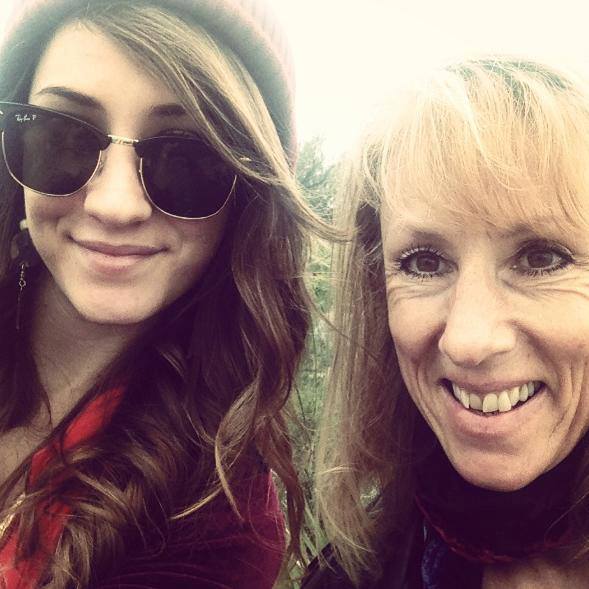I’ve always been obsessed with food, you might even call it a food addiction.
I just love tucking into a tasty, tree-ripened nectarine, a scoop of freshly churned, creamy hazelnut gelato, a sweet, honey chai tea, a Wild Women On Top chocolate chip cookie or a buckini bar.
I love contemplating food, seeing food, smelling food, tasting food and eating food. I love creating new recipes and dreaming endlessly about precisely the right combination of yum to tickle my fancy and nourish my body and brain.
One of my fondest childhood memories involves climbing high up into the branches of our backyard nectarine tree, finding a comfortable perch, and balancing there for a couple of heavenly hours gorging on the deliciously flavoursome, tree-ripened flesh.
Unfortunately, my love of food also meant I was always the chunkiest person on my gymnastics team, earning me the nickname Dumbo and kicking off a lifelong struggle with food addiction and weight obsession.
To feed my teenage sugar addiction, I got a job as a gelato scooper. Whenever my boss wasn’t looking, I was scooping the delicious stuff straight into my mouth. I thought nothing of eating a whole tub of ice cream on my own, and by the time I was eighteen, I had imported a commercial–sized ice cream churn from the US to get my fix.
I reached adulthood during the low-fat diet craze, which suited me perfectly because I loved sugar. Fruit and ice cream were my diet staples, leading me to frequent binging throughout my late teens and early twenties.
Because I had massive boobs and a strong, muscular body, I always saw myself as being too big. I especially envied girls with skinny arms.
One time when I was visiting my mum with my new boyfriend, I ran and hid under my bed because my family laughed at me for having bigger arms than him.
Desperate to lose weight, I tried every crazy diet that came my way. My favourite was the Beverly Hills diet – a totally unscientific weight loss plan that has you eating only one kind of fruit each day. On pineapple day I lost weight because I got mouth ulcers, while on mango day I gained weight because I ate 24 mangoes.
I became a physical education teacher, gym junkie, aerobics instructor, show dancer and fitness trainer, all fun activities that – I believed – required me to be lean. The thought of having to wear a G-string leotard in public fuelled my weight obsession and sugar fuelled my food addiction.
When I found myself sticking my fingers down my throat and vomiting in the shower after a big binge, I knew I had a problem.
Pregnancy brought temporary relief. For the first time in my life, I ate just for nourishment. But once my babies were born, my food issues returned.
I regularly overate, fasted and overate again. I spent every day thinking about what I had or hadn’t eaten, what I should or shouldn’t have eaten. I would ride my bike 20km to have the biggest, creamiest gelato I could get, then ride my bike back home – a way to indulge my craving, and my love of bike riding, without gaining weight.
I was constantly worried about gaining weight and was always striving to be leaner, because that’s what gymnasts, dancers and aerobics instructors are supposed to be, right?
I exercised obsessively because it made me happy, and I could eat more.
I thought this was pretty normal. That is, until my daughter Bella suggested otherwise.

“I thought my food habits were normal, until my daughter suggested otherwise.”
“Mum’s food issues” were a family joke, but they had serious implications for Bella.
She saw me as the food police as I tried to limit her childhood consumption of junk food. I didn’t want her to develop my food addiction, so I found secret hiding spots for chocolate and sweet treats, and I often said, “You’ve had enough,” after one bowl of ice cream or one helping of dinner.
It didn’t work, but I’ll leave her to tell that story.
As I watched her overcome her own food issues, I decided it was time to investigate mine, learn about food addiction and try to get my obsession under control.
I discovered that food addiction is a very real thing, affecting up to 11% of adults. I also learned that a high-sugar diet in children, including fruit sugar (fructose), can create addictive pathways into adulthood, which can be impossible to manage.
In her book Hedonic Eating, How the Pleasure of Food Affects Our Brains and Behaviour, neuroscientist, psychologist and food addiction specialist Dr Nicole Avena examines the neurological changes that occur from overconsumption of sugar and ultra-processed foods, revealing that like nicotine, cocaine and alcohol, food can be addictive.
Scientists now understand that for some of us, the ability to stop eating is not about hunger and it’s not about willpower. It’s about irreversible neurological changes in the brain and triggering our reward/dopamine system resulting in a loss of psychological control, which, regardless of the consequences, compels us to eat.
Having studied nutrition and addiction in my Masters of Lifestyle Medicine and done the Yale Food Addiction test, I believe I may have developed a mild sugar addiction in childhood.
This became a moderate sugar addition in my teens and early twenties because of a high sugar, low-fat diet, which caused neurological and psychological changes in my brain, leading to the cravings and withdrawals typical of addictions.

“I still crave ice cream sometimes and I often eat more than my body needs.”
So, how do I manage now?
Well, I still haven’t got it completely sorted. I still struggle to know – and stop – when I’ve had enough, I still crave ice cream sometimes and I often eat more than my body needs.
I snack when I’m not hungry and rely on daily weigh-ins to know if I’ve eaten “too much”. I often overeat when I’m sharing dishes at restaurants and going away without my scales usually means I’ll gain a couple of kilos and then eat less or fast when I get home.
But in choosing a Mediterranean-style diet, avoiding ultra-processed foods and sugar, using the magic pill of exercise every day, learning from the experts, and choosing a career-oriented around health, my relationship with food is improving.
I no longer binge, which is a big plus.
If there’s one thing I want people to take away from my story it’s this; just because you live in a fit, lean, healthy body doesn’t mean you don’t have food issues. We’re all only human.
And if you do have a difficult relationship with food, you’re not alone.









